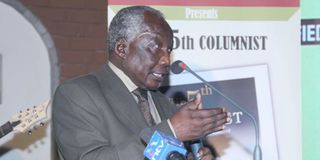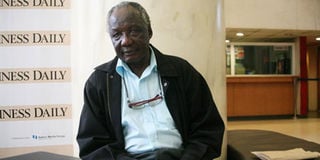How Philip Ochieng's courage and commitment changed the world

Philip Ochieng during its unveiling of Liz Gitonga's book about him titled "The 5th Columnist: A Legendary Journalist", at the Stanley hotel in Nairobi on August 21, 2015.
What you need to know:
- As the curtain falls on veteran journalist, social critic, linguist and philosopher Philip Ochieng' Otani, he leaves behind a legacy of excellence.
The late Philip Ochieng', son of Otani, once penned an article under the 'crying' headline “In My Parlance Parliament is But a Palaver” at the height of the agitation for re-introduction of multi-party politics in Kenya.
The article was an instant sensation. He explained that palaver is a talkshop where people relish in endless arguments. Our Kenyan Parliament, according to Ochieng', was literally a place of rigmarole.
He referred to parliamentarians as layabouts, pinheads, insolent, intellectual lilliputians and indolent individuals who carried themselves with undeserved aura of importance.
Predictably, 'honorable members' were up in arms against him, with one Hon Lasoi, then Assistant Minister for Planning and National Development, challenging him to a public debate in English language.
Ochieng' stuck to his blazing guns.
Shouting matches were common in Parliament between the so-called 'progressive forces' of the then unofficial opposition and the KANU's 'conservative forces.'
The Kenya Constitution still contained the infamous Section 2A that stated 'There shall be in Kenya only one political party, the Kenya African National Union, Kanu.'
Ochieng' then served as the editor-in-chief of the official Kanu (read government) newspaper, Kenya Times. He didn't for one minute trust the agitators for multiparty democracy, arguing that those young irritants were simply interested in taking over the government in order to extract private benefits.
Ochieng' argued very strongly that the brand of multiparty politics that the opposition was agitating for wouldn't guarantee national cohesion in a multi-ethnic society like Kenya.
He saw the noises in Parliament and in the streets of Nairobi as strong indications of a group of greenhorns pitting the hoi polloi against their own government so that the regime could be replaced by another group of people that had been waiting on the wings for far too long for 'their turn to eat’.
Entitlement and State capture
According to Ochieng', that agitation would end up introducing tribalism of monumental proportions. That prediction has since come to pass.
'Democracy' has introduced a sense of entitlement, impunity, and state capture by the ruling elite. After all, welders of power argue, 'the people voted for us.'
Most of the time the people's signatures are merely used to legitimise a rigged presidential vote. At that time, nobody cared to listen to Ochieng'.
The increasingly draconian Kanu regime under Daniel arap Moi had exhausted citizens with its repression, detentions without trial, torture, assassinations and mismanagement of national resources and image.
In such circumstances, any replacement was welcome. The devil in the details would be interrogated later. The country was ripe for regime change at all costs, and so, nobody was willing to listen to Philip Ochieng'.
Nobody thought of using the opportune constitutional moment that presented itself then to think through the kind of governance structures that would catapult the country to the next level of development.
Everybody shouted 'we want change' and 'Moi must go.' Any voice of reason at that time was easily dubbed 'an enemy of the people'.
More on this: A salute to philosopher and wordsmith Philip Ochieng
Ochieng' vindicated
Slightly more than three decades later, Ochieng' has been vindicated. He had dissected the Kenyan society, and utilized his sharp wit to analyse its underlying forces. He was right.
The progressive forces of the dying decades of the 20th Century have become our political and economic tormentors of the early 21st Century.
Ochieng' saw this spectacle of imminent ruthless and unapologetic tribalism long before most Kenyans could imagine it. Ochieng' had the benefit of exposure.
In the early 1950s, he had excelled in his Standard Eight national examinations, earning a Form One place for secondary education at the prestigious African Boys School (later, Alliance).
As a keen student, Ochieng' not only excelled in his studies at Alliance but also got early exposure to diverse Kenyan cultures. He was to continue his cultural education when he went across the Atlantic Ocean as part of the group of young men and women who ventured into the 'land of opportunities' in search of further education.
The group was dubbed the 'Tom Mboya Airlift' after TJ Mboya, the sponsor of the programme.
By his own admission in his masterpiece 'I Accuse the Press', Ochieng' left the US without a university degree. He was impatient.
By some accounts, he believed that he had covered most of the material that was being taught in class, hence his boredom.
Cloud of controversy
Ochieng' later travelled to Europe and enrolled in schools in Switzerland and France, but again, left without graduating.
Back in Kenya, armed with a sharp analytical mind, immense knowledge, but without a degree certificate, Ochieng' worked briefly in the civil service of the newly independent Kenya before joining the private sector where he launched his journalism career at the Daily Nation Newspaper.
Small controversies bordering on personality conflicts forced Ochieng' to move to Dar-es- salaam where he worked under the veteran journalist Ben Mukapa, who later became the third President of independent Tanzania.
It was in Dar where Ochieng' horned his unique and amazing skills in journalism, on the desk. Ochieng' surprises his readers by stating in his books that he never quite had formal training in journalism.
This reality was to later come alive in early 1990s when Kenyan university teachers went on a prolonged strike, leaving public institutions without instructors.
Given his experience and proven ability, the School of Journalism of the University of Nairobi accepted him as one of its instructors.
When he started teaching, lecturers were up in arms against the university, accusing it of hiring unqualified individuals to teach.
It was later revealed that most of those who were shouting their voices hoarse had themselves been Ochieng's pupils on the desk at Nation Media Group and other media houses.
Back to Dar-es-salaam. Ochieng' left Tanzania under a cloud of controversy, with the main accusation levelled against him being disrespect for the Tanzanian people through his use of strong English words to describe the behavior of the people and their leaders.
Tanzanians couldn't countenance a foreigner who wrote and spoke to them pejoratively in a language that they used only sparingly as a 'foreign language' rather than 'second language' as was the practice in neighboring Kenya.

"The 5th Columnist: A Legendary Journalist", Liz Gitonga-Wanjohi’s biography of veteran editor Philip Ochieng.
Under the skin
But those who thought that Ochieng's lethal pen was only directed at Tanzanians had to think again as Ugandans and Kenyans too began to feel the effect of his itching pen.
Ochieng's pen went under the skin, rubbing both the powerful and ordinary citizens alike the wrong way. The beauty of Ochieng's writing, however, was that it took one a while to glean the real meanings in the words.
Like the late Ali Alamin Mazrui, Ochieng' was a wordsmith, but while Mazrui wrote for all of us, Ochieng' and Wole Soyinka made it very clear that they wrote only for 'their readers.'
Like the Nobel Laureate Wole Soyinka, Ochieng' argued that if 'you found his column too hard or boring, then it wasn't meant for you, and you were free to flip other pages including those dedicated to cooking and obituaries'.
Of course, this earned him many accusations of arrogance, spitefulness, assuming, inconsiderate, among others. But Ochieng' was not moved, always arguing that he couldn't be expected, after many years of learning, to write in pedestrian language to accommodate intellectual lilliputians.
Again, this was always controversial. There are those who believe that the essence of communication is to put across one's ideas to as many people as possible so they can effortlessly understand them.

The late Philip Ochieng.
Legacy of excellence
But there are also people who believe in demonstrating intellectual prowess. Of course, there are readers who feel comfortable with mouthful words and expressions. I happen to admire both extremes.
For this reason, I was one of the most ardent consumers of Ochieng's columns.
Whenever he wrote for the Sunday Nation, I made sure to buy a copy. Ochieng' gave me and others reason to study harder.
As a social critic, Ochieng' feared nobody. When need be, he attacked the President, Vice President, the Cabinet, Senior Politicians and Parliamentarians.
Whenever he directed his pen to the media houses and editors, everyone scampered to safety. You dared take on Ochieng' at your own risk. His eye for detail and richness of the written word just left everyone in awe.
But Ochieng' too had his matches in the media and the academy. He respected journalists Hilary Ng'weno, Salim Lone and Sarah Elderkin as much as he revered media scholar Polycarp Omolo Ochillo, and the late linguistic guru Professor Okoth Okombo.
Ochieng's comrade at Alliance, Professor Ngugi wa Thiong'o, remained his blossom friend throughout his life.
In life, the late Ugandan poet, Okot p'Bitek, was Ochieng's cultural buddy and 'laughing partner.'
As the curtain falls on veteran journalist, social critic, linguist and philosopher Philip Ochieng' Otani, he leaves behind a legacy of excellence.
In Ochieng's life, we learn one big lesson: it's not the certificates, the diplomas and degrees that matter, but one's ability, passion and commitment that change the world.
Celestial beings are much richer and happier now with Ochieng's arrival in their midst.
RIP Philip Ochieng' Otani.
Dr. Vincent Ongore is scholar and Corporate Governance and Tax expert based at the Technical University of Kenya.
He previously worked for three decades at Kenya Revenue Authority, rising to the level of Chief Manager. [email protected]




